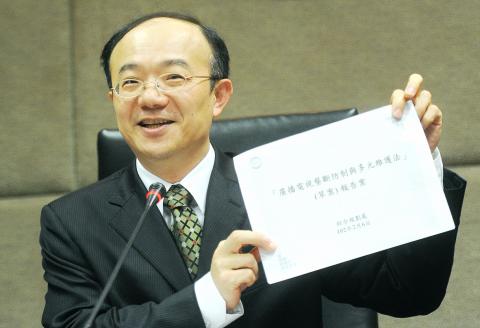An act to prevent monopolization of the media, proposed by the National Communications Commission (NCC), would require media companies to file an application for a merger to proceed if the matter involves mergers in the broadcasting and print media sector, while the commission would not approve any case in which the media ownership concentration level has reached a specified “ceiling.”
The commission yesterday unveiled the general legal framework of the act, which was titled “The broadcasting media monopolization prevention and diversity preservation act (廣播電視壟斷防制與多元維護法).”
Commission chairperson Howard Shyr (石世豪) said that members of the commission have yet to discuss each article in the act, adding that they would decide when the topic would be listed on their agenda the week after the Lunar New Year holiday.

Photo: Liu Hsin-de, Taipei Times
“Each commissioner has been given a stack of materials about the draft act to read over the holiday,” Shyr said.
Based on Shyr’s presentation, the legislation would tackle monopolization of the media and its negative influence on society through four different aspects: regulating media ownership concentration and cross-media monopolization; preserving the professionalism and independence of news media; facilitating the development of diverse cultures and citizens’ autonomy; and facilitating laws under the jurisdiction of other government agencies.
Shyr said that the commission plans to adopt four different levels to regulate media ownership concentration and cross-media ownership. If the broadcasting media merge among themselves and have any change in management or operations, they would be obligated to file an application for the merger with the commission. The legislation would also regulate mergers in the broadcasting and print media sector.
“However, the commission cannot regulate mergers of newspapers, because the commission is not the administrative agency in charge of newspapers,” Shyr said.
Though a certain merger case might endanger the public interest, Shyr said that the commission might still approve it by adding conditional clauses and ensuring that the parties involved in the case fulfill those clauses.
If the commission ascertains that a merger will definitely jeopardize the public interest and would not lead to normal market development, the government would in principle not approve it, Shyr said.
“The only exception would be that the parties in the mergers agree to the terms set by the commission and be willing to subject themselves to the commission’s follow-up supervision and regulations,” he added.
If a merger would cause the level of media ownership concentration to hit a set ceiling, Shyr said that there would be no need for the commission to investigate the facts of the deal and such a deal would be rejected unconditionally.
“The ‘ceiling’ we will set down will be very specific and will not be bent to accommodate different individual cases,” he said.
Meanwhile, Shyr said that the commission would make sure that the proposed act would complement relevant laws in other government agencies.
The act, he said, would require that broadcast media present information about their operations to the commission to help it make informed decisions on cases.

Taipei has once again made it to the top 100 in Oxford Economics’ Global Cities Index 2025 report, moving up five places from last year to 60. The annual index, which was published last month, evaluated 1,000 of the most populated metropolises based on five indices — economics, human capital, quality of life, environment and governance. New York maintained its top spot this year, placing first in the economics index thanks to the strength of its vibrant financial industry and economic stability. Taipei ranked 263rd in economics, 44th in human capital, 15th in quality of life, 284th for environment and 75th in governance,

Greenpeace yesterday said that it is to appeal a decision last month by the Taipei High Administrative Court to dismiss its 2021 lawsuit against the Ministry of Economic Affairs over “loose” regulations governing major corporate electricity consumers. The climate-related lawsuit — the first of its kind in Taiwan — sought to require the government to enforce higher green energy thresholds on major corporations to reduce emissions in light of climate change and an uptick in extreme weather. The suit, filed by Greenpeace East Asia, the Environmental Jurists Association and four individual plaintiffs, was dismissed on May 8 following four years of litigation. The

A former officer in China’s People’s Liberation Army (PLA) who witnessed the aftermath of the 1989 Tiananmen Square massacre has warned that Taiwan could face a similar fate if China attempts to unify the country by force. Li Xiaoming (李曉明), who was deployed to Beijing as a junior officer during the crackdown, said Taiwanese people should study the massacre carefully, because it offers a glimpse of what Beijing is willing to do to suppress dissent. “What happened in Tiananmen Square could happen in Taiwan too,” Li told CNA in a May 22 interview, ahead of the massacre’s 36th anniversary. “If Taiwanese students or

The New Taipei City Government would assist relatives of those killed or injured in last month’s car-ramming incident in Sansia District (三峽) to secure compensation, Mayor Hou You-yi (侯友宜) said yesterday, two days after the driver died in a hospital. “The city government will do its best to help the relatives of the car crash incident seek compensation,” Hou said. The mayor also said that the city’s Legal Affairs, Education and Social Welfare departments have established a joint mechanism to “provide coordinated assistance” to victims and their families. Three people were killed and 12 injured when a car plowed into schoolchildren and their